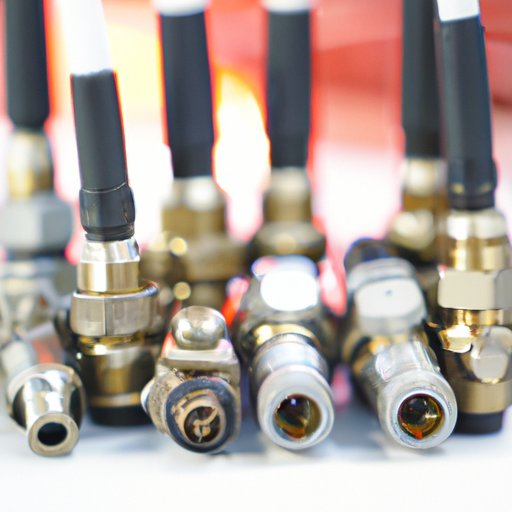Introduction
Fuel injectors play a crucial role in modern engines. They are responsible for providing the right amount of fuel to the engine at the right time. In order to understand how fuel injectors work, it’s important to first understand the basics of fuel injection systems.
Overview of How Fuel Injectors Work
The basic components of a fuel injection system include the fuel pump, fuel rail, injectors, intake manifold, and throttle body. The fuel pump pumps fuel from the fuel tank to the fuel rail. The fuel rail is a pipe that connects all the injectors together. Each injector is designed to spray a specific amount of fuel into the intake manifold. The throttle body controls the amount of air entering the engine, which affects the amount of fuel injected.
When the engine is running, the fuel injectors will open and close according to the signals sent by the engine control unit (ECU). The ECU monitors the engine’s speed, temperature, and other parameters in order to determine the correct amount of fuel to inject. When the injectors open, fuel is sprayed into the intake manifold, where it mixes with the air before entering the combustion chamber. Once the fuel is ignited, it creates the power needed to move the vehicle forward.
Benefits of Fuel Injection
Fuel injection has many advantages over carburetors, which were used in older vehicles. The most significant benefit of fuel injection is improved fuel efficiency. Fuel injection systems are much more efficient than carburetors because they can precisely meter the amount of fuel being injected into the engine. This allows for better fuel economy and fewer emissions. Additionally, fuel injection systems are easier to maintain since they don’t require frequent adjustments or cleaning.
Mechanics of Fuel Injection
Fuel injection systems use a variety of components to deliver fuel to the engine. First, the fuel pump pressurizes the fuel and sends it to the fuel rail. The fuel rail is a metal pipe that runs along the side of the engine and connects the fuel pump to the injectors. Each injector is connected to the fuel rail via a rubber hose. The injectors are opened and closed by electrical signals sent by the ECU. When the injectors are opened, fuel is sprayed into the intake manifold, where it mixes with the air before entering the combustion chamber.

Pros and Cons of Fuel Injection
Fuel injection systems provide many benefits, including increased fuel efficiency and reduced emissions. However, there are some drawbacks to fuel injection as well. One of the main disadvantages is the cost. Fuel injection systems are more expensive than carburetors and require more maintenance. Additionally, fuel injection systems can be prone to clogs or leaks if not regularly maintained.

Common Problems with Fuel Injectors
Fuel injectors can have a variety of issues that can cause them to malfunction. Some of the most common problems include clogged injectors, leaking injectors, and faulty wiring. Clogged injectors are caused by dirt and debris building up inside the injector, while leaking injectors can be caused by worn seals or cracked housings. Faulty wiring can also cause fuel injectors to malfunction.
Diagnosing Issues with Fuel Injectors
If you suspect that your fuel injectors are having problems, the first step is to diagnose the issue. This can be done using a code reader or an oscilloscope. Code readers can detect any fault codes stored in the engine control unit, while an oscilloscope can measure the voltage at the injectors to see if they are working properly. If a problem is detected, it is important to take the vehicle to a qualified mechanic for further inspection.

Repairing Issues with Fuel Injectors
Once a problem has been diagnosed, it’s time to repair the issue. Depending on the problem, this may involve replacing the fuel injectors, cleaning the injectors, or repairing the wiring. It is important to use only high-quality parts when repairing fuel injectors, as cheap parts often fail quickly. Additionally, it is important to use a qualified mechanic who is familiar with fuel injection systems.
Conclusion
Fuel injectors are an integral part of any engine. Understanding how they work and the benefits they offer can help you keep your vehicle running smoothly. Additionally, knowing how to diagnose and repair common issues with fuel injectors can help you save time and money in the long run.
(Note: Is this article not meeting your expectations? Do you have knowledge or insights to share? Unlock new opportunities and expand your reach by joining our authors team. Click Registration to join us and share your expertise with our readers.)
